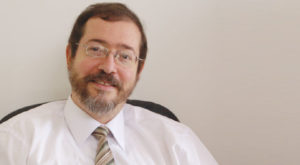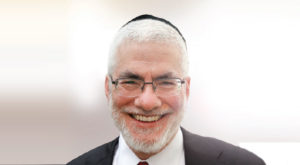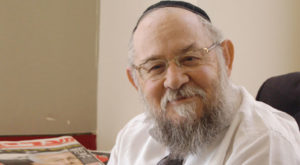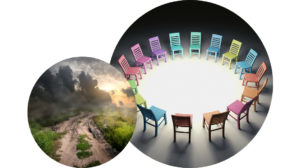Inbox: Issue 866

"Rabbi Emanuel Feldman’s excellent Second Thoughts piece (“Up Is Down and Down Is Up”) should be published in every newspaper and magazine throughout the country and blasted out in every media platform available"
Sephardim Were There First [Latino Lakewood / Issue 866)
Thank you for your feature on the new religious development in Mexico. A few corrections and some background are in order.
Jews from Syria and Iraq didn’t start coming after the Ashkenazim, as the article says. In 1909, Jews from Aleppo, Syria, founded their first association in Mexico City — 13 years before any Ashkenazi religious or communal entity would appear on the scene. The first Jewish communal organization in the country, known as Alianza Monte Sinaí, composed of both Ashkenazi and Sephardi Jews, was established in 1912 in that city.
The website of the Justo Sierra 71 synagogue in Mexico City, the first founded by Ashkenazi Jews there, tells the story of the community, but it doesn’t identify one particular person as its founder.
In a room in the old La Merced market, in downtown Mexico City, Jewish immigrants from Hungary, Lithuania, Poland, and Russia founded a charitable organization called Nidjei Israel in 1922. Religious services were held in rented rooms or in private homes.
In 1937 the community purchased two houses on Justo Sierra Street, numbers 71 and 73, where a synagogue, a community center, and a social hall would be established. The Justo Sierra 71 synagogue, also known as Nidjei Israel, the third-oldest in Mexico City, is now a cultural center.
One of the two Jewish neighborhoods where most of the Jews live in Mexico City is Polanco, not Polanca, as stated in the article. The last greeting in the article was misspelled as well. It should be “felicidades,” not “felicinades.”
Daniel Santacruz
Maaleh Adumim, Israel
Required Reading [Second Thoughts / Issue 866]
I have lived on four continents and in ten countries or states. Thirty years ago, when I first came to the United States of America, I quickly saw that this was the second-best place in the world to live — second only to Eretz Yisrael.
The America of today — with its polarization and hate — is not the same as it was 30 years ago. Rabbi Emanuel Feldman’s excellent Second Thoughts piece (“Up Is Down and Down Is Up”) should be published in every newspaper and magazine throughout the country and blasted out in every media platform available. Everyone — from the politicians down to the homeless children in our society — should wake up to the absolute truth of Rabbi Feldman’s words, before this country goes the way of ancient Rome and Greece.
Eleazar Durden
South Florida
They Share and We Share [Second Thoughts / Issue 866]
Bravo to Rabbi Emanuel Feldman for having the courage to say things exactly as they are without worrying about being politically correct (or racist, for that matter).
Both my husband and I were raised in Europe but did not want to bring up our children on that post-Holocaust blood-soiled continent. With a lot of courage, a hefty dose of youthful naivete, and two little children in tow, we picked ourselves up and moved to California with the hope of establishing a fine Jewish family in this medinah shel chesed, b’siyata d’Shmaya.
Forty-plus years later, I am shocked at watching the moral fabric of this great country unravel right in front of my very eyes. What ever happened to honesty, hard work, integrity, respect for another‘s property, morality, self-discipline, and self-respect?
Rabbi Feldman’s piece reminds me of a phone conversation I had with a relative on the East Coast. This took place right during the post-Floyd disaster, BLM riots, burning, looting and all.
She related to me how her cousin’s cleaning lady pulled out her cell phone and proudly showed off a clip of her teenage son rioting and looting. She was literally shepping nachas!
Can you believe something like that? This woman gets free medical care and other freebies, and instead of being grateful to her host country, she is proud of her son robbing someone else of his hard-earned possessions!
After my initial wave of nausea subsided, I asked myself the following question: What kind of a clip would a Jewish mother proudly share with her friend? It would certainly be her son’s Chumash seudah, her daughter’s siddur party, her older son’s bar mitzvah pshetl and possibly her Bais Yaakov daughter’s chesed award.
These positive thoughts restored my balance somewhat. Watching Yiddishe families blossom all over the county, Torah mosdos flourish, and endless acts of tzedakah and chesed being performed on a daily basis, my heart was ignited with a ray of hope that in the very near future this insanity will vanish from our planet and Mashiach will usher in the Geulah Sheleimah. (Maybe then the UFOs will want to join us too.)
Raizy Brief,
Los Angeles
The Answer I Sought [Eternal Flame / Issue 865]
I thoroughly enjoyed Dovi Safier’s excellent article on Rav Elchonon Wasserman.
Back in 1983, I attended an Agudah convention in New York where a certain highly regarded individual was expounding on the importance and infallibility of daas Torah. I asked him afterward how he understood Reb Elchonon’s daas Torah in light of his decision to return to Europe, given that it led to his death at the hands of the Nazis.
“Wouldn’t a live Reb Elchonon staying in New York have accomplished more for Torah to thrive in America than a martyred Reb Elchonon?” I asked.
The individual quoted Maseches Gittin 56b, to the effect that sometimes Hashem “turns wise men backward and makes their knowledge foolish.” He explained further that in order for His gezeirah to be implemented, Hashem dulled Reb Elchonon’s daas Torah so that he would return to Europe.
Something about the answer didn’t resonate with me. First, it didn’t answer my question about Reb Elchonon’s daas Torah. Second, it didn’t sit well with me. How could Reb Elchonon be a daas Torah on the one hand, and compromised on the other?
Years later, at the West Coast’s first Agudah convention, I met Rav Simcha Wasserman and asked to speak privately. Daring to tread ever so lightly, I ventured to retell Reb Simcha about the explanation I had heard for Reb Elchonon’s return to Europe.
Reb Simcha got visibly emotional and upset. He drew me near to him and said that he sensed that I was in turmoil with that answer and did not like it. He asked me why I thought Reb Elchonon returned to Europe. Being put on the spot, and shooting from the hip, I responded instinctively that a father jumps into a burning building to save his child. Reb Simcha smiled and beamed in approval.
“To say that my father’s daas Torah was compromised or dulled even an iota is pure slander,” he said. “My father’s wits and intellect were at their sharpest. Parents entrusted their children to his yeshivah. He felt responsible for them.” And then he repeated my impromptu comment: “And a father jumps into the fire to save his son.”
When I read your article describing how the local rabbanim pleaded with him to stay in America, and how Reb Elchonon responded, “I don’t only have two sons, I have hundreds,” I came full circle, having found validation for what Rav Simcha Wasserman told me privately. Indeed, his daas Torah was shining as brightly as ever.
Baruch C. Cohen, Esq.
Don’t Give Up [Inbox / Issue 865]
To the girl who wrote into the Inbox about her experiences with several siblings who are off the derech, my heart goes out to you. It must be very hard for you living with your siblings the way they are.
I have a sibling who was off the derech for a few years. It was extremely painful for me for many reasons. I didn’t really speak about it enough with anyone. I think people are more busy with the pain the parents are going through (and there are chizuk groups and meetings for them) and don’t realize how hard it may be for the siblings.
I just want to tell you (and all other siblings reading this) — please, please don’t give up. Please stay strong. Try to be happy. Hashem is with you all the time. And have courage and strength to speak to people that can listen to you, help and guide you, and give you all the chizuk you need.
Hashem should help us with all that we need.
One of the many trying to be strong and close to Hashem
Still Going Strong [Unlimited / Shul with a View — Issue 865]
I enjoy your publication despite my being the last one in the family to get to read it (but first to pay for it). I especially enjoyed Rabbi Eisenman’s article titled “Unlimited,” which featured the hakaras hatov of the bochurim (and rebbeim) of the Mesivta of Clifton (MOC) by helping arrange the chairs in the “Ahavas,” Rabbi Eisenman’s shul.
While we’re on the subject of unlimited hakaras hatov, I’d like to publicly acknowledge my own debt of gratitude to MOC. Thus far, I have sent two of my sons to MOC. Years after graduating, they both maintain a kesher with their rebbi and have continued to learn daf hashavua (bein hasedorim, of course) with them, even across different time zones.
It is my hope in sharing this vignette that it will be accepted in lieu of an application fee for my son who will b’ezras Hashem be entering eighth grade this coming year. I hope you are reading this, Rabbi Halberstadt!
Judah Gross
Stop Pointing Fingers [Inbox / Issue 864]
I’ve been a little behind on reading Mishpacha, and am now discovering what seems to be a contest to see who can lay more blame at the other’s feet with regards to the salaries of our rebbeim and teachers.
Why are we pointing fingers? Nothing will be solved by leveling angry accusations along the lines of “you don’t prioritize the right things, you should be paying more.”
Let’s focus on where (I think) most people would agree:
- Rebbeim and teachers deserve and need to be paid more.
- Yeshivos and schools don’t have the ability to pay more.
- Parents typically have formidable tuition bills.
- Wealthy people tend to have many institutions crying out to them for money.
Perhaps I’m being naive in saying that most people pay what they can and give the tzedakah they can afford. Are there people who try to get away with paying less in tuition than they can afford? Probably. Are there “wealthy board members” who could do more to support our schools? Again, probably. I’d like to think they are in the minority. If they’re not, we might have other, larger issues to discuss.
I don’t have many suggestions to offer that would help solve the combined issues of low salaries and high tuition (two sides of the same coin). However, I highly doubt pointing pitchforks at one group, followed by responses of “you don’t care enough,” are helpful. This is going to sound clichéd and silly, but it’s true: We all share similar goals. We need to work together to help resolve these seemingly intractable issues.
E. Golddeer
The Final Word [Blacklisted/Double Take — Issue 864]
The Double Take story you recently featured is quite disturbing. Essentially the camp director decided to make a decision regarding a new camper based on an old situation that affected her — because of her assumptions about a family and her feelings about their mother.
A few years ago my husband unfortunately sued someone due to a significant business loss because of a breakdown in communication. Obviously this decision was not taken lightly. Unbeknownst to us, the man he sued happened to have been a next-door neighbor of our teen son’s camp director.
You can imagine our surprise and sadness when our son, who had previously attended the camp, was told “there was no room” that year, even though everyone else he knew who applied got in, especially returning campers. Any attempts to speak to the camp director or to bring in daas Torah were ignored.
Camp directors have tremendous responsibilities. But no camp director should have full autonomy to decide who gets into a camp based on their own personal feelings about a situation without consulting daas Torah or conducting a discussion with senior leaders and/or owners of the camp. The secretary who answers numerous calls does not count as an advisory panel.
Camp is not a mandatory yeshivah program. It is where children spend their summers being with friends, growing in ruchniyus and learning by example from good mechanchim.
In your story, the director who rejected the new girl should reassess her beliefs about what camp means to each and every child as an individual. And there should be a team in place to discuss admissions, if necessary, which includes proper communication with families without dismissive notices that are extremely baseless and hurtful.
T. G.
(Originally featured in Mishpacha, Issue 867)
Oops! We could not locate your form.







